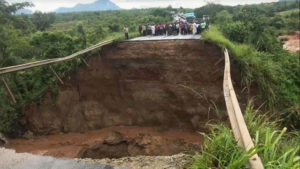by Ben Taylor
Progress with financing for Standard Gauge Railway
The government has made further progress towards raising finance for work on upgrading the Central Line railway, after signing a loan agreement with Standard Chartered Bank Tanzania for $1.46 billion.
The money will go towards the estimated $14 billion cost of the project, which involves replacing the existing colonial-era line from Dar es Salaam to Dodoma and beyond with standard gauge track. Specifically, the Ministry of Finance and Planning said in a statement that the loan would fund the section from Dar to Matukupora, near Dodoma.
“Standard Chartered Tanzania acted as global co-ordinator, bookrunner and mandated lead arranger on the facility agreement that is the largest foreign currency financing raised by the ministry of finance to date,” the statement said, adding that most of the financing would come from Sweden’s and Denmark’s export credit agencies.
The loan repayments are spread over a 20-year timespan, but no details of interest rates were made public.
Road bridge brought down by floods
Floods in early March brought down a major road bridge on the main road between Morogoro and Dodoma. This effectively left travellers and traders without a simple road connection between the country’s economic and political.
Following the collapse of the Kiegeya Bridge near Dumila, bus operators were forced to divert via Iringa to connect between Dodoma and Dar es Salaam and individual travellers had to pay higher ticket prices. Those transporting cargo by truck had to wait for a temporary bridge to be completed. This applied also to those connecting from Dar through Dodoma to other major towns including Singida, Tabora, Mwanza, Kigoma, Geita and Shinyanga, and to Rwanda and Burundi.
The Prime Minister, Kassim Majaliwa, while touring ongoing work to build a temporary replacement bridge, ordered that the acting manager for Tanzania Roads Agency (Tanroads) in Morogoro, Mr Godfrey Andalwisye, be removed from office. The Prime Minister felt that negligence by Tanroads engineers, failing to conduct routine checks on infrastructure, had contributed to the collapse of the bridge.
Mr Majaliwa asked Tanzania People’s Defence Forces (TPDF) and road engineers in Morogoro and Dodoma to join their forces and ensure that they find an alternative route so that vehicles can start passing the area as construction work on the bridge continues. A temporary crossing was brought into use a few days later.
Dar commuter rail route expansion proposed
The Tanzania Railway Corporation (TRC) has proposed expanding its network of commuter rail services in and around Dar es Salaam. Their plan involves the construction of six new lines, in addition to the three lines currently providing services to commuters on sections of the Central line and TAZARA line.
The proposed new lines would link Mikocheni-Ubungo-Tazara (route A), City Centre-airport (route B), Mwenge-Bagamoyo (route C), PuguKibaha-Kunduchi (route D), Mtoni-Tabata-Ubungo-Mwenge (route E) and City Centre-Kigamboni via Nyerere Bridge (route F). A feasibility study a preliminary design were completed in December 2019, according to TRC.
TRC’s director of Corporate Planning and Investment, Ms Nzeyimana Dyegula, noted that rapid population growth in Dar es Salaam meant increasing need for commuter transport services.
“The annual population growth in Dar city is an average of 6.1%,” she explained, “with expectation of reaching around 10 million people come 2030 from current six million. The increasing population will also need transport.”
Approximately 6 million passengers (around 20,000 per day) used the existing commuter rail routes in Dar es Salaam in 2018.
Another legal and financial blow to Air Tanzania
Longstanding disputes between Tanzania and various international suppliers and financiers have caused multiple problems in recent years, hampering the revival of the Air Tanzania (ATCL) spearheaded by President Magufuli. The latest case came when a UK court ruled that ATCL will have to pay a Liberian company $30 million in compensation for an aborted aircraft leasing deal.
The case involved a 2013 aircraft-leasing deal from Willis Trading, signed by former ATCL managing director David Mattaka. UK High Court Judge Christopher Butcher ordered ATCL to pay the money plus interest that reportedly amounts to $10 million to the Liberian company.
Willis Trading went to court to enforce its claim after ATCL pulled out of the lease contract and subsequent compensation agreement in 2014. The government had challenged the deal which President Magufuli has publicly condemned.
Mr Mattaka was in March 2016 charged in court with abuse of office and abuse of position for signing the lease without complying with the relevant procurement legislation. The case is still pending in court in Tanzania.
The UK court rejected ATCL’s efforts to shrug off the debt by blaming its former CEO Mattaka.
The lease agreement stems from the Tanzanian government’s 2007 decision to expand and modernize the fleet of Air Tanzania which it partially owned then. The Ministry of Infrastructure Development gave permission to Mr Mattaka to lease aircraft as an interim measure until certain Airbus aircraft were available starting in 2011.
The agreement required the airline to pay $370,000 (TSh 851m) per
month for the used Airbus airplane. But work needed to be done on the plane, which operated flights only between May and December 2008 before being grounded again for additional maintenance work.
According to the judgement, after ATCL stopped paying for the lease, which resulted in a debt due to Wallis of more than $45 million, the parties reached a settlement in August 2013, in which the government agreed to pay $42 million (TSh 96.6bn). After making six payments up until October 2014, totalling more than $26 million (TSh 59.8bn), the government stopped making payments.
Previous cases have seen new or recently-purchased Air Tanzania aircraft impounded in Canada and South Africa following court decisions in favour of companies that have financial claims against the government of Tanzania.

